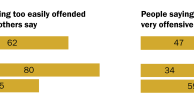Most Asian Americans experience discrimination in many parts of their day-to-day lives. In the survey, we asked Asian American adults if they have ever experienced discrimination or been treated unfairly because of their race or ethnicity.
In addition to this broad question, we also asked whether they have experienced specific discrimination incidents in their everyday life. These include incidents in interpersonal encounters with strangers; at security checkpoints; with the police; in the workplace; at restaurants or stores; and in their neighborhoods.
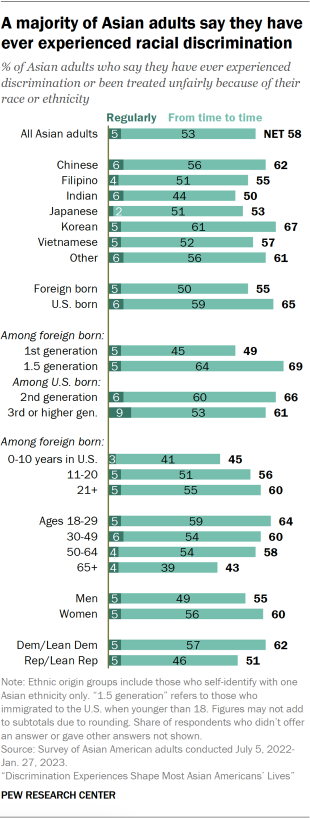
About six-in-ten Asian adults (58%) say they have ever experienced racial discrimination or been treated unfairly because of their race or ethnicity. This includes 53% of Asian adults who say they have experienced racial discrimination from time to time and 5% who say they experience it regularly.
Whether Asian adults say they have experienced racial discrimination varies across some demographic groups:
- Ethnic origin: 67% of Korean adults say they have experienced racial discrimination, higher than the shares among Vietnamese (57%), Filipino (55%) and Indian (50%) adults.
- Nativity: U.S.-born Asian adults are more likely than immigrants to say they have experienced racial discrimination, 65% versus 55%.
- Immigrant generation: 69% of Asian immigrants who are 1.5 generation – those who came to the U.S before they were 18 years old – say they have ever experienced racial discrimination. About half of immigrants who traveled to the U.S. as adults (first generation) say the same.
- Years in U.S.: 45% of immigrants who arrived in the U.S. in the last decade say they have experienced racial discrimination, compared with 60% of those who have been in the U.S. for more than 20 years.12
Discrimination in interpersonal encounters with strangers
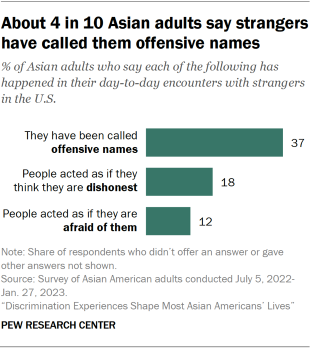
In the survey, we asked Asian adults whether they have experienced discrimination incidents in their daily interpersonal encounters with strangers.
- 37% of Asian adults say strangers have called them offensive names.
- 18% say strangers have acted as if they thought they were dishonest.
- 12% say people have acted as if they were afraid of them.
Experiences with offensive name-calling
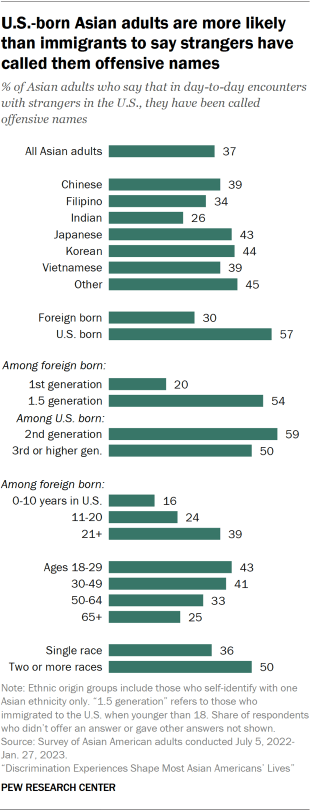
About 37% of Asian adults say that in day-to-day encounters in the U.S., strangers have called them offensive names. Whether Asian adults say they have had this experience is associated with their experiences with immigration:
- 57% of U.S.-born Asian adults say strangers have called them offensive names. They are nearly twice as likely as Asian immigrants (30%) to say this.
- Among immigrants, 54% of Asian adults who immigrated as children (1.5 generation) say they have been called offensive names by strangers, while 20% of those who immigrated as adults (first generation) say the same.
- 39% of immigrants who have been in the U.S. for more than two decades say they have been called offensive names. By contrast, 16% of those who immigrated 10 years ago or less say the same.
Responses also vary across other demographic groups:
- Ethnic origin: 26% of Indian adults say strangers have called them offensive names, a lower share than other origin groups.
- Regional origin: This pattern is also echoed among regional origin groups. Among South Asian adults overall, 29% say they have been called offensive names, compared with higher shares of East (41%) and Southeast (39%) Asian adults.
- Age: About four-in-ten Asian adults under 50 years old say they have been called offensive names, compared with 33% of those 50 to 64 and 25% of those 65 and older.
- Race: 50% of Asian adults who identify with two or more races – that is, those who identify as Asian in addition to at least one other race – say they have been called offensive names by strangers during day-to-day encounters. In comparison, 36% of those who are single race – those who identify as Asian and no other race – say the same.
In the survey, we also asked Asian Americans whether they have ever hidden part of their heritage – including cultural customs, food, clothing or religious practices – from non-Asians. Whether Asian Americans have hidden their culture is associated with their experiences of being called offensive names:
- 60% of Asian adults who have hidden their heritage say they have also been called offensive names by strangers, compared with 32% of those who have not hidden part of their heritage.
In their own words: Asian Americans’ experiences of being called slurs and offensive names
A note to readers
This section contains racial slurs and other terms that may be offensive to readers. Quotations have been lightly edited for grammar, spelling and clarity, but we have chosen not to censor language out of respect to those who agreed to share their personal experiences.
In the 2021 focus groups of Asian Americans, many participants talked about their experiences being bullied, harassed or called offensive names because of their race or ethnicity:
“As an Indian female, we tend to be very hairy … starting very young, so in sixth and seventh grade I was super hairy and so all the other girls would be like, ‘Oh my god, are you like shaving already? Or what’s going on with that?’ And then people would call me, ‘Sand N-word.’ A lot of just like, ‘Saddam’s daughter,’ just like those types of words.”
–U.S.-born woman of Indian origin in late 30s
“The first time that I can ever remember experiencing racism and discrimination was when I was 3. I was on the playground … and I was playing with this White girl and then her mom came … [and] was just like, ‘Don’t play with that chink,’ and I didn’t know how to take that at the time. I didn’t think anything of it because I didn’t know what it was and then, you know, it was put in my memory for the next god knows how many years and it wasn’t until I heard that word again, ironically watching [the 2000 film] ‘The Debut’ [with Dante Basco] … and I remember they called him ‘chink’ in there and I was like – it just unlocked a memory and that’s when I really started to … understand race and prejudice and discrimination.”
–U.S.-born woman of Filipino origin in late 20s
“I remember that I first came [to my neighborhood], there were not too many Chinese [people there]. [Kids] would shout behind my back: ‘Japs, Japs.’ They were about 8, 10 years old.”
–Immigrant man of Taiwanese origin in mid-70s (translated from Mandarin)
“We just have to deal with it more than the average person. I’ve been called DJ Isis, I’ve been called terrorist. … [O]n a day-to-day basis I feel welcome [in America]. This is my country. I’m here to live; I’m here to stay. But there are just those one or two instances that just make you feel like maybe it would have been better if I was somewhere else or maybe it would have been different if I was White or whatever. I feel like the only person that’s going to be 100% fully welcome is a White male and that’s the only person that’s going to be 100% welcome 100% of the time.”
–U.S.-born man of Indian descent in late 20s
“I had my assigned parking lot, and when a White man parked his car on my spot, I told him to move his car, he said ‘Ching Chang Chong’ to me and called the guard.”
–Immigrant man of Korean descent in late 40s (translated from Korean)
“When I was in college, I had a White girlfriend and … [her family was] very kind to me … but one time, we got invited to a party at her aunt and uncle’s house and … [her mom] says to me, ‘Can you help bring this food into the house?’ so … I picked up some trays of food, walked them into the house, and her aunt comes to the door and says to me, ‘No. Bring it around the back,’ … and then I could hear her in earshot say to the girlfriend’s mother, ‘Oh, these fucking spic caterers. What’s wrong with them? Don’t they know that the service entrance is in the rear?’ … I heard her mother correct her on the spot, but … that’s just one example of many, that much racism I’ve had when I’ve interracially dated. … I just shut my mouth. I didn’t retaliate. I didn’t want to make trouble but … I regret not having spoken up for myself.”
–U.S.-born man of Filipino descent in early 40s
Experiences with people treating them like they are dishonest or afraid of them
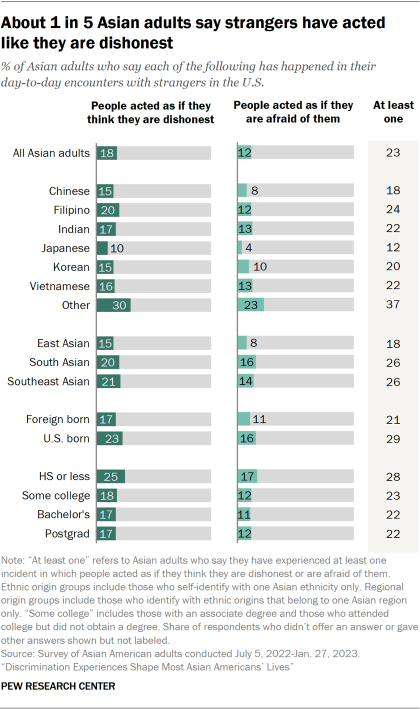
About a quarter of Asian adults (23%) say they have had at least one encounter in which a stranger acted like they were dishonest or afraid of them. This includes 18% who say strangers have acted as if they were dishonest and 12% who say people have acted as if they were afraid of them.
There are differences across some Asian origin groups:
- Ethnic origin: 37% of those who collectively belong to less populous Asian origin groups (those categorized as some “other” origin in this report) say they have had at least one of these experiences. This is higher than the shares among the six largest Asian origin groups.
- Regional origin: 26% each of South and Southeast Asian adults say strangers have treated them at least one of these ways, compared with 18% of East Asian adults.
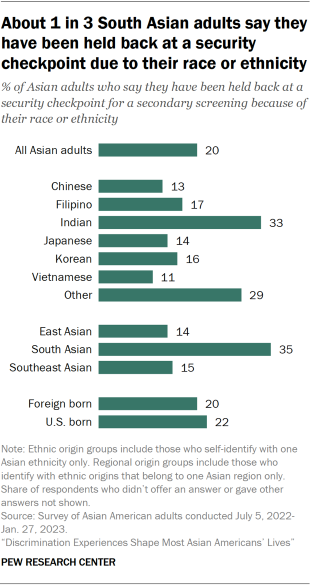
Racial discrimination at security checkpoints
Among Asian adults overall, 20% say they have been held back at a security checkpoint for a secondary screening because of their race or ethnicity.
Across regional origin groups, South Asian adults are the most likely to have this experience, with 35% saying so. This is about twice the shares among Southeast (15%) and East (14%) Asian adults who say the same.
Among South Asian adults, those born in the U.S. are more likely than immigrants to say they have had this experience.13
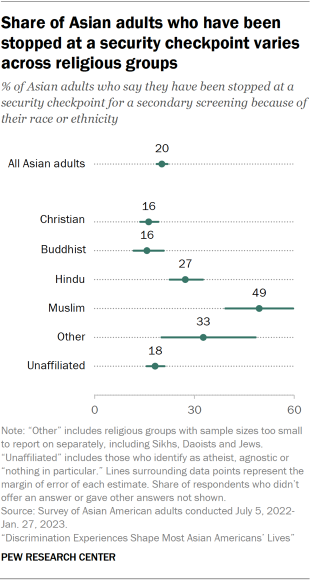
There are also key findings by religion among Asian Americans:
- Asian American Muslims are more likely than some other religious groups – including Asian Hindus, those who are religiously unaffiliated, Christians and Buddhists – to say that they have been stopped at a security checkpoint for a secondary screening because of their race or ethnicity.
- About a quarter of Asian Hindus also say they have had this experience.
Notably, South Asian adults make up a higher share of Asian Muslims and Hindus in the U.S. than other regional Asian origin groups.
In their own words: Asian Americans’ experiences with racial profiling at airports and other post-9/11 discrimination experiences
Some participants of South Asian origin in our 2021 focus groups of Asian Americans talked about facing discriminatory backlash after the events of Sept. 11, 2001.
Some participants talked about their experiences with being racially profiled by airport security:
“[Once, when I was flying back to the U.S., airport security] pulled me away from my family for three hours because I had a beard. … They didn’t believe my passport was real, [they thought] that I was trying to sneak in, and they pulled me away, no context of where they were taking me or anything and my mom was freaking out the whole time, and they interrogated me asking me a bunch of different questions … I was 17 at the time. … This happens every time I fly now, so I tell my friends to be two hours late to pick me up from an airport. I mean, this is not a joke. This is every time I travel. Every time, they do this to me.”
–U.S.-born man of Pakistani origin in early 30s
“My brother-in-law’s son was stopped because his beard had grown and they felt that he may be from some terrorist group. Hence, he was stopped for two hours and cross-questioned. When he came back home, his mother, my sister-in-law, told him to shave his beard and moustache clean as he looked exactly like ‘them.’”
–Immigrant woman of Indian origin in early 50s (translated from Hindi)
“[My family was] going to Pakistan and it was like a week after 9/11 for a wedding and … TSA or someone in a uniform looked at me like he wanted me to die. … That was one [memory] that really stood out and then the other was my schoolteacher. She was like, ‘It’s just not fair that we’re being punished for something that your people did,’ or something. … I was in first grade.”
–U.S.-born woman of Pakistani origin in mid-20s
Other participants talked about other physical attacks or ways they and their family had to change their behavior:
“When a friend of mine and I were on the way to work during the week the 9/11 incident had taken place, we were assaulted with eggs. … But other local people helped us, they chased after the car that attacked us with eggs. So, incidents like that have taken place.”
–Immigrant man of Sri Lankan origin in late 40s (translated from Sinhalese)
“After 9/11, things changed a lot. I feel like things changed for a lot of us and I remember my parents putting out American flags everywhere – outside the house, on the mailbox, like wherever they could stick them. And even now, I do get … constantly pulled over when you’re in line at the airport, by TSA and at this point I just know I’m going to get pulled over. … I make my way leisurely to that section because I know that they’re going to profile me.”
–U.S.-born woman of Indian origin in early 30s
“[W]hen I was a kid … one of my neighbors ran their car into our house. It was just the weirdest thing ever because … their garage is aligned to the side of our house and then they crashed the side of our house and then we asked them, ‘How did this happen?’ You don’t just run into someone’s house, especially when there’s grass and like a fence in the way. They’re like, ‘Oh yeah. It’s my son. We’re just teaching him to drive. He did it by accident.’ … [T]o this day, we knew it was like more racially motivated just because we’re the only Pakistani family in the neighborhood, but they deemed it an accident.”
–U.S.-born man of Pakistani origin in early 20s
Backlash against Muslims, Sikhs, Arabs and South Asians post-9/11
Following the Sept. 11 attacks, discrimination against Muslims, Sikhs, Arabs, South Asians and others perceived to be part of these groups in the U.S. increased. Amid concern about national security among government officials and the general public alike, there were significant changes in immigration law and policy, including the formation the Department of Homeland Security, the creation of the National Security Entry-Exit Registration System and the passage of the USA/PATRIOT Act, among others.
Muslim Americans faced increased scrutiny and surveillance. Other religious and ethnic groups also became targets of discrimination incidents and hate crimes, including the 2012 mass shooting at a Sikh temple in Oak Creek, Wisconsin.
Anti-Muslim sentiment and scrutiny has continued in recent years and continues to touch the lives of Muslims, Sikhs, Arabs and South Asians living in the U.S. Previous Pew Research Center surveys have found that from 2007 to 2017, increasing shares of Muslim Americans said they have personally experienced discrimination. And among the American public, people held more negative views of Muslims and Islam after the Sept. 11 attacks.
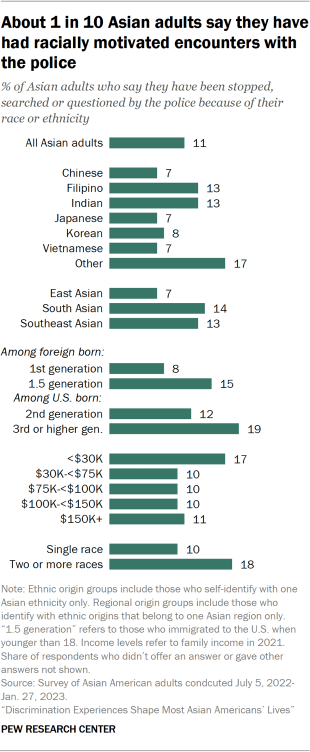
Encounters with police because of race or ethnicity
About one-in-ten Asian adults (11%) say they have been stopped, searched or questioned by the police because of their race or ethnicity.14
Whether Asian Americans say they have had this experience varies somewhat across demographic groups:
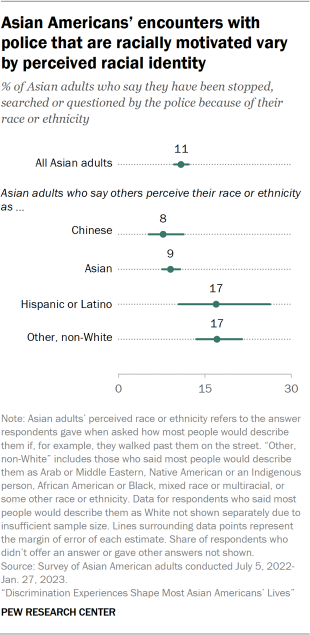
- Ethnic origin: 17% of Asian adults who belong to less populous origin groups say they have had an encounter with the police because of their race or ethnicity. This is higher than the shares among Korean (8%), Vietnamese (7%), Chinese (7%) and Japanese (7%) adults who say the same.
- Regional origin: 14% of South and 13% of Southeast Asian adults say they have had this experience, while about half that share of East Asian adults (7%) say the same.
- Income: 17% of Asian adults who have a family income under $30,000 say they have been stopped, searched or questioned by the police because of their race or ethnicity, compared with about one-in-ten adults with higher incomes.
- Race: 18% of Asian adults who identify with two or more races say they have had this experience, compared with 10% of Asian adults who are single race.
There are also some findings based on how others perceive Asian Americans’ racial or ethnic identity:
- About one-in-ten Asian adults who are perceived as Chinese or Asian say they have been stopped, searched or questioned by the police because of their race or ethnicity.
- A somewhat larger share of Asian adults who are perceived as some other non-White and non-Asian race or ethnicity say the same.
Racial discrimination in the workplace
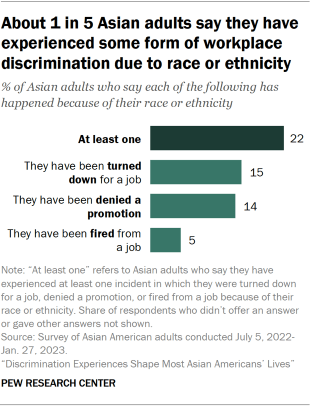
About one-in-five Asian adults (22%) say they have experienced at least one of three forms of workplace discrimination because of their race or ethnicity:15
- 15% of Asian Americans say they have been turned down for a job.
- 14% say they have been denied a promotion.
- 5% say they have been fired from a job.
Asian Americans’ experiences with race-based workplace discrimination vary across some demographic groups:
- Ethnic origin: Japanese adults are the least likely to say they have experienced at least one of these three incidents of racial discrimination in the workplace. Compared with other origin groups, they are less likely to say they have been turned down for a job (5%) or denied a promotion (4%).
- Immigrant generation: Among those born in the U.S., 27% of third- or higher-generation Asian Americans say they have experienced at least one of three incidents of workplace discrimination, while 17% among the second generation say the same. About 13% of those in third or higher generations say they have been fired from a job because of their race or ethnicity, compared with 5% of second-generation Asian adults who say the same.
- Gender: Asian men are slightly more likely than Asian women to say they have been denied a promotion because of their race or ethnicity (16% vs. 11%). On the other two measures, nearly identical shares of men and women say they have had the experience.
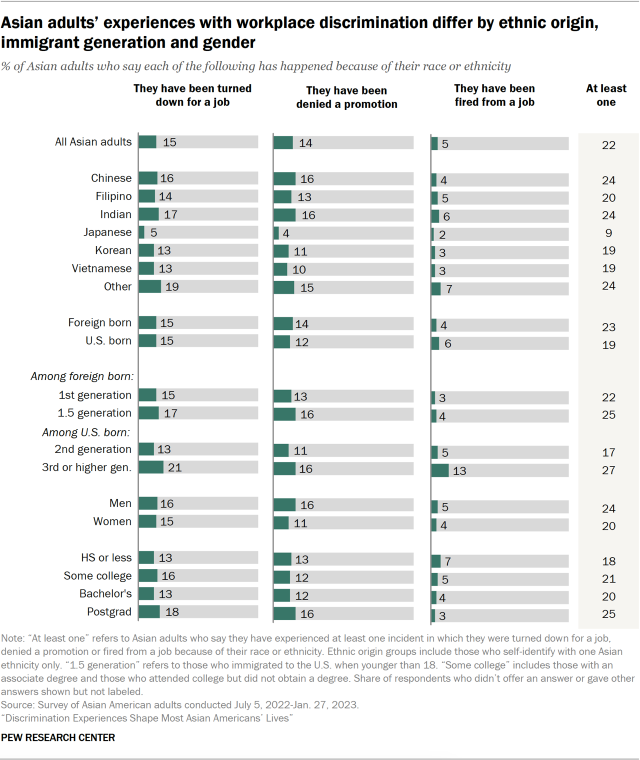
Qualitative research findings related to Asian immigrants’ challenges with language and culture in the workplace
In a December 2022 Pew Research Center report, we explored Asian immigrants’ experiences with navigating language barriers in the United States. The following findings are related to some of the survey findings on Asian immigrants’ experiences of discrimination in the workplace:
- Many participants pointed to their difficulties speaking in English as a major reason they struggled to find employment. For example, many discussed struggling in interviews or feeling like they did not receive callbacks due to their language ability.
- Some participants shared that once employed, language barriers slowed their professional success and advancement.
- Participants also noted that their accents when speaking English affected how they were treated at work, including having their co-workers or customers treat them differently or missing out on opportunities.
Quality of service in restaurants and stores
Four-in-ten Asian adults say they have received poorer service than other people at restaurants or stores. This varies somewhat across demographic groups:
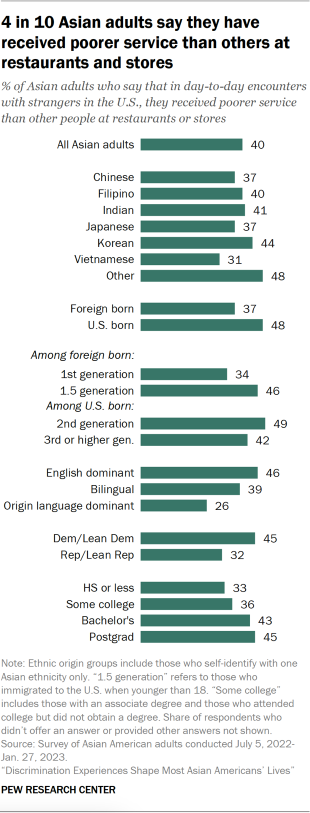
- Ethnic origin: 48% of those who belong to less populous origin groups say they have had this experience, compared with smaller shares of Chinese (37%) and Vietnamese (31%) adults.
- Nativity: 48% of U.S.-born adults say they have received poorer service, while 37% of immigrants say the same.
- Immigrant generation: 49% of Asian adults who are the children of immigrant parents (second generation) and 46% of Asian adults who immigrated as children (1.5 generation) say they have received poorer service at restaurants or stores. Among third- or higher-generation Asian Americans, 42% have had this experience, as have 34% of the first generation.
- Language: 46% of Asian adults who primarily speak English say they have had this experience, compared with 39% those who are bilingual and 26% of those who primarily speak their Asian origin language.
- Party: 45% of Asian adults who identify with or lean toward the Democratic Party say they have received poorer service, higher than the share among Republicans and Republican leaners (32%).
- Education: More than four-in-ten Asian adults with a bachelor’s degree or higher say this has happened to them, compared with roughly one-third of those with some college experience or less.
Discrimination in neighborhoods
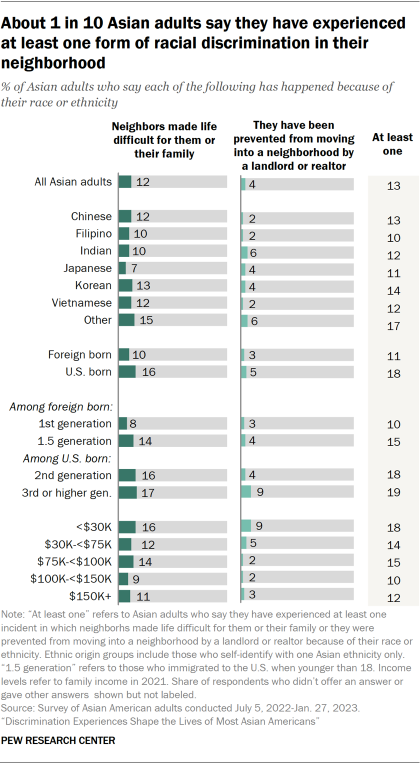
About one-in-ten Asian adults (12%) say neighbors have made life difficult for them or their family because of their race or ethnicity. And 4% say they have been prevented from moving into a neighborhood by a landlord or realtor for the same reason.16
Asian Americans’ experiences of housing and social discrimination in neighborhoods differs across some demographic factors:
- Nativity: 16% of U.S.-born Asian adults say neighbors have made life difficult for them or their family, compared with 10% of Asian immigrants.
- Immigrant generation: Third-generation Asian Americans (9%) are more likely than the second generation and all Asian immigrants to say they have been prevented from moving into a neighborhood by a landlord or realtor because of their race or ethnicity.
- Income: 9% of Asian adults with family incomes of less than $30,000 say they have been prevented from moving into a neighborhood by a landlord or realtor due to their race or ethnicity, compared with about 5% or fewer among those who make $30,000 or more.

